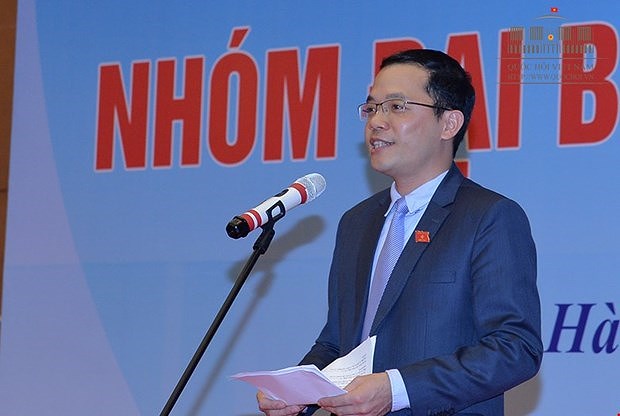 Vice Chairman of the National Assembly’s Young Parliamentarians Group Dinh Cong Sy. (Photo: quochoi.vn)
Vice Chairman of the National Assembly’s Young Parliamentarians Group Dinh Cong Sy. (Photo: quochoi.vn) Vietnam puts great importance on
fostering the youth’s development, with more and more young people elected as
deputies to the National Assembly (NA) every tenure, said Dinh Cong Sy, Vice
Chairman of the NA’s Young Parliamentarians Group, at a global conference on
April 28.
Sy is among around 200 young parliamentarians attending
the Inter-Parliamentary Union (IPU)’s 7th Global Conference of Young
Parliamentarians, themed “Post-COVID-19 recovery: A youth-responsive approach,”
held virtually on April 28 – 29.
He cited the fact that Vietnam’s NA adopted the Youth Law
last year, and in 2011, established the Young Parliamentarians Group which now
consists of 131 members under 45, accounting for 26 percent of total
legislators to the 14th NA. The group aims at strengthening connectivity among
young legislators and enhancing their engagement and contribution to the NA’s
agenda, he said.
He noted that the NA young deputies have been very
proactive in law-making, supreme supervision and decision-making, particularly
major national affairs while listening to the youth’s opinions and wishes and
conveying their expectations to the NA.
They have been also working to assess the impacts of laws
and policies on the youth, he said, adding that many opinions and
recommendations of young NA members have been taken into account in policy and
law making.
Sy held that it is very important to promote youth
empowerment and participation in policy and law making and to bolster capacity
building to sharpen their leadership skills.
Addressing the launch of the event, IPU Secretary General
Martin Chungong said the health and socio-economic shocks brought about by the
COVID-19 pandemic have impacted significantly young men and women all around
the world. A new chapter for youth empowerment is needed and this new chapter
must be at the heart of post-pandemic recovery efforts, he said.
This year’s conference focuses on preserving and fulfilling
fundamental youth rights and stepping up youth empowerment across the pandemic
recovery efforts; exploring the best means to promote youth participation in
shaping youth-responsive recovery; providing guidance on how to reinforce
education systems, maximize youth employment, and adjust health services
everywhere.
It features four debate sessions, namely “Youth
participation: A sine qua non for youth-responsive recovery from the COVID-19
pandemic,” “Supporting higher and university education: A priority of the
recovery agenda,” “Healthy youth beyond the pandemic” and “Economic
empowerment: Transforming the challenge into an opportunity.”/.